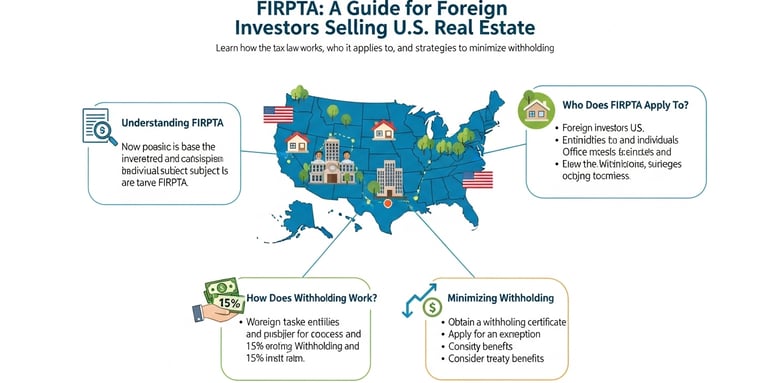Understanding FIRPTA: A Guide for Foreign Investors Selling U.S. Real Estate
A clear guide to FIRPTA for foreign investors selling U.S. real estate. Learn how the tax law works, who it applies to, and strategies to minimize withholding.
REAL ESTATE ABCSREAL ESTATE INVESTING
8/28/20253 分钟阅读


Introduction
If you’re a foreign investor thinking about selling U.S. real estate, there’s a crucial tax law you need to know: FIRPTA, the Foreign Investment in Real Property Tax Act. Many foreign sellers are surprised when a portion of their sale proceeds is withheld at closing. This law has big implications for your bottom line, but with the right knowledge and planning, you can reduce unnecessary costs and protect your investment.
In this post, I’ll break down what FIRPTA is, how it works, and practical strategies to minimize its impact.
What is FIRPTA and Why Does It Exist?
Before 1980, many foreign investors sold U.S. property without paying capital gains tax, leaving the IRS unable to collect. To close this loophole, Congress passed FIRPTA.
Key takeaway: When a foreign person sells U.S. real estate, the IRS requires that 10–15% of the gross sales price be withheld as a tax prepayment.
This isn’t necessarily the final tax owed—it’s more like a security deposit. After filing your U.S. tax return, you can often reclaim some (or even all) of it if the actual tax liability is lower.
Who Does FIRPTA Apply To?
Under U.S. tax law, a “foreign person” includes:
Nonresident aliens (individuals not meeting residency tests)
Foreign corporations or partnerships
Foreign trusts and estates
Notably:
If you stay in the U.S. more than 183 days in a year under certain visas (like H1-B or L1), you’re considered a tax resident, and FIRPTA won’t apply.
Green card holders are also exempt.
Students with F visas, however, remain classified as foreign for tax purposes—even if they meet the 183-day rule—so FIRPTA applies.
How the Withholding Process Works
When a foreign seller sells a U.S. property:
The buyer, through the title company, withholds 10–15% of the sale price.
Funds are sent to the IRS within 20 days of closing.
The seller must later file a U.S. tax return to determine the actual tax due.
If the property sold at a loss, the entire withheld amount can be refunded.
If the actual tax is lower than the withheld amount, you’ll receive a partial refund.
Important forms:
IRS Form 8288 (withholding report by buyer)
IRS Form 8288-A (statement of withheld tax)
IRS Form 8288-B (application for reduced withholding certificate)
Are There Exemptions or Ways to Reduce FIRPTA?
Yes—foreign sellers can often reduce or avoid the withholding if they plan ahead:
Sale price under $300,000 + buyer intends to use property as a primary residence: FIRPTA may not apply.
Withholding certificate (IRS Form 8288-B): You can apply for reduced or delayed withholding if the actual tax owed will be less than 10–15%.
Ownership structure: Investing through a U.S. corporation instead of directly may avoid FIRPTA, though it brings other tax considerations.
Tax deductions: Keep records of depreciation, repairs, and improvements to lower taxable gains.
State-Level Withholding Rules
In addition to FIRPTA (a federal law), some states also impose their own withholding taxes on foreign sellers. For example, Georgia has its own withholding law requiring a three percent (3%) withholding on the gain for non-Georgia residents selling property in the state. Always check your state-specific requirements before selling.
Smart Strategies for Foreign Investors
Consider properties under $300,000 if you want to avoid FIRPTA.
Work with a knowledgeable tax professional to file for refunds and deductions.
If your long-term plan is multiple U.S. investments, explore obtaining U.S. residency or structuring investments through U.S. entities.
Don’t rely on cut-rate closing companies that may mishandle FIRPTA paperwork—the liability could shift to the buyer if done incorrectly.
Conclusion
Selling U.S. real estate as a foreign investor is not as straightforward as it seems. FIRPTA is designed to ensure the IRS collects its share, but with smart planning, you can avoid overpaying and protect your returns.
Thinking about buying a home in Metro Atlanta? Contact me today for a free consultation—I’ll help you navigate the process and find the right home with confidence.
Disclaimer: The content on this blog is for informational and educational purposes only and does not constitute professional real estate, financial, or legal advice. All investments involve risk, including the possible loss of capital. Past performance of any market or investment is not a guarantee of future results. The real estate market changes constantly, and while we strive for accuracy, we make no guarantees about the completeness or reliability of the information presented. You should always consult with a qualified professional before making any investment or financial decision.
MICHIGAN OFFICE
office.metrostar@gmail.com
248-716-5899




GEORGIA OFFICE
raintreepm@hotmail.com
470-236-9199
